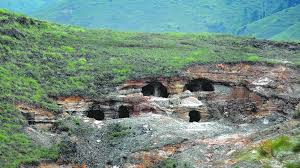- Courses
- GS Full Course 1 Year
- GS Full Course 2 Year
- GS Full Course 3 Year
- GS Full Course Till Selection
- CSAT
- 5 LAYERED ARJUNA Mentorship
- Public Administration Optional
- Online Program
- GS Recorded Course
- NCERT (Recorded 500+ Hours)
- Polity Recorded Course
- Geography Recorded Course
- Economy Recorded Course
- AMAC Recorded Course
- Modern India, Post Independence & World History
- Environment Recoded Course
- Governance Recoded Course
- Science & Tech. Recoded Course
- International Relations and Internal Security Recorded Course
- Disaster Management Module Course
- Ethics Recoded Course
- Essay Recoded Course
- Current Affairs Recoded Course
- ABOUT US
- OUR TOPPERS
- TEST SERIES
- FREE STUDY MATERIAL
- VIDEOS
- CONTACT US
Rat-Hole Mining in India: An Ethical Dilemma Beneath the Surface
Rat-Hole Mining in India: An Ethical Dilemma Beneath the Surface

Rat-hole mining is a controversial and hazardous method of coal extraction, commonly seen in parts of Northeast India, especially Meghalaya. Despite a ban by the National Green Tribunal (NGT) in 2014 due to its detrimental environmental and human impacts, this practice persists illegally in several regions. It reflects not only regulatory and administrative failure but also raises profound ethical questions concerning human dignity, environmental justice, and societal responsibility.
What is Rat-Hole Mining and Why is it Problematic?
Rat-hole mining involves digging narrow, horizontal tunnels just wide enough for a person to enter and extract coal. While this method is cost-effective and easily accessible for local communities, it is extremely unsafe. Workers, often children and the economically vulnerable, risk their lives in poorly ventilated and unsupported mines. The practice leads to frequent accidents, respiratory diseases, and even deaths. Furthermore, it causes significant environmental degradation, including groundwater contamination and deforestation.
How Does Rat-Hole Mining Violate Ethical Principles?
Ethical implications of rat-hole mining through major philosophical and ethical lenses:
1. Buddhist Ethics
- It violates Ahimsa (non-violence) by endangering lives.
- It creates Dukkha (suffering) through exploitation and unsafe labor.
- The principle of Right Livelihood is broken, as the work involves harm.
- The economic activity contradicts the Middle Path, promoting greed and harm over balance and compassion.
2. Swami Vivekananda’s Practical Vedanta
- Rat-hole mining denies individuals their inherent dignity and potential.
- It neglects the Vedantic call for social service and upliftment.
- The duty towards social equity is abandoned, reducing human beings to tools for profit.
3. Rabindranath Tagore’s Humanism
- This practice destroys the harmony between human beings and nature.
- It ignores universal human dignity, fostering exploitation.
- It reveals a collapse of the collective moral conscience of society.
4. Kantian Ethics (Immanuel Kant)
- Treating miners merely as means to economic gain violates Kant’s Second Categorical Imperative.
- Rational autonomy is ignored, with workers reduced to instruments for commercial benefit.
- The fundamental respect due to human life is compromised.
5. Rousseau’s Social Contract Theory
- The state, as per Rousseau, must protect all citizens. Its failure here shows a breach of the social contract.
- The general will is disregarded in favor of powerful interests.
- Vulnerable communities are exploited by the powerful with impunity.
6. Dharmic Ethics
- Both the state and mine owners fail in their Dharma (righteous duty).
- There is disruption of both the natural order (environmental harm) and social order (inequality).
- A failure of Raj Dharma—the duty of the state to protect and govern justly—is evident.
7. Ambedkar’s Modern Indian Thought
- The state fails to provide security and dignity, especially to marginalized sections.
- It perpetuates caste- and class-based economic exploitation.
- True democracy is hollow without the guarantee of dignity and safety.
8. John Rawls’ Theory of Social Justice
- Rat-hole mining violates the difference principle—the worst-off are being further exploited.
- There is a lack of institutional safeguards to protect laborers.
- Economic desperation forces people into hazardous jobs, widening inequality.
9. Amartya Sen’s Capability Approach
- The state fails to ensure basic capabilities like safe work, health, and education.
- People are deprived of choices and forced into "unfreedoms" due to economic compulsion.
- There is no provision of alternative, dignified livelihoods.
10. Gandhian Ethics
- Economic exploitation here is a form of violence, contrary to Gandhian non-violence.
- The practice violates Sarvodaya (welfare of all), benefiting a few at the cost of many.
- There is a breach of Trusteeship, where owners ignore their moral duty to care for workers.
- Swadeshi principles, favoring local, sustainable livelihoods, are completely bypassed.
11. Rule Utilitarianism (J.S. Mill)
- The long-term harm—including environmental damage and human suffering—outweighs the short-term economic benefit.
- The broader community suffers due to ecological degradation.
- The absence of proper regulation results in greater collective suffering than individual gain.
What is the Ethical Way Forward?
To address the issue of rat-hole mining, we must adopt a multi-pronged ethical approach based on three pillars: Ethical Standards, Integrity Systems, and Moral Aptitude.
1. ETHICAL STANDARDS (What Must Be Upheld)
- Practice sustainable and responsible mining.
- Ensure human dignity and labor safety are non-negotiable.
- Comply with environmental regulations and resource conservation norms.
- Promote fair labor practices, including minimum wages and child labor prohibition.
- Maintain transparency and accountability in mining operations.
- Ensure equitable distribution of natural resources.
2. INTEGRITY SYSTEMS (Tools for Implementation)
Regulatory Framework
- Enforce strict licensing systems for mining operations.
- Conduct regular safety audits and environmental impact assessments.
- Protect workers through labor rights mechanisms.
- Create effective grievance redressal systems.
Monitoring Mechanisms
- Use technology (like drones, sensors) for real-time surveillance.
- Set up independent oversight bodies.
- Empower community-based monitoring systems.
- Ensure regular compliance reporting and transparent documentation.
3. MORAL APTITUDE (Human Element in Decision Making)
Sensitivity
- Be aware of the vulnerabilities of workers.
- Acknowledge the environmental and social impact of mining.
- Respect cultural and ecological sensitivities of indigenous communities.
Moral Reasoning
- Carefully balance economic growth with human safety and dignity.
- Promote long-term sustainability over short-term profit.
- Use ethical frameworks to make informed, just decisions.
Leadership
- Exhibit proactive leadership in solving ground-level issues.
- Engage with all stakeholders, including local communities and workers.
- Encourage innovation in safety and sustainable alternatives.
- Display resilience and responsiveness during mining-related crises.
Implementation Wisdom
- Plan a phased transition away from rat-hole mining.
- Develop alternative livelihood programs (e.g., tourism, horticulture, skill-based employment).
- Invest in skill development and education of local communities.
- Involve communities in decision-making and benefit-sharing.
- Use resources optimally without compromising future generations.
Rat-hole mining is not just an illegal economic practice; it is an ethical failure on many levels—governance, societal values, environmental responsibility, and human rights. A just society must not prosper at the cost of its most vulnerable citizens. The path forward lies in embedding ethics in every stage of resource management—from policy and regulation to ground-level implementation and community participation. Only then can India truly uphold the ideals of justice, equity, and dignity enshrined in its Constitution.




